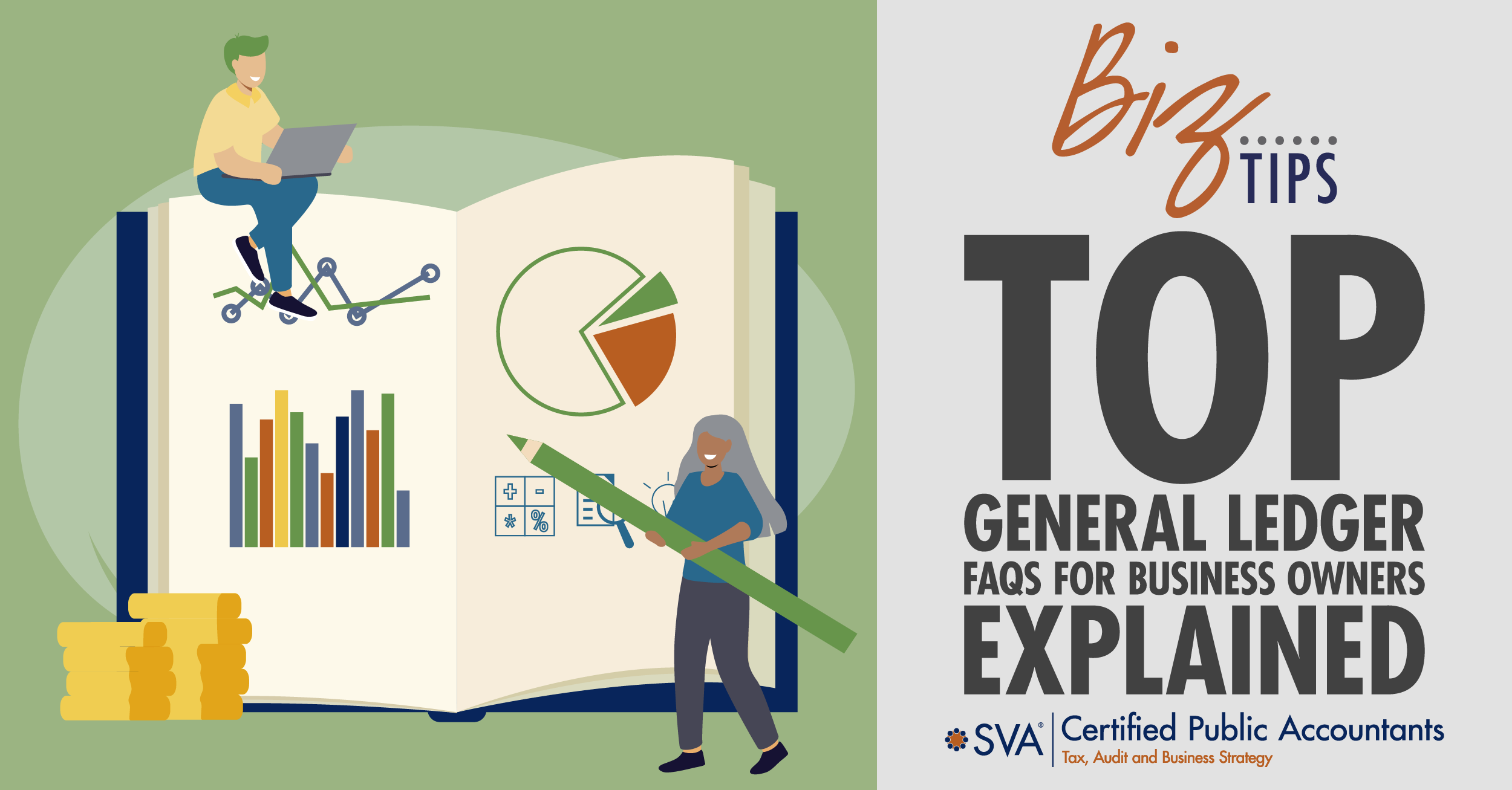| Highlights |
- Summarizes common general ledger questions business owners have, explaining what a general ledger is and how it supports accurate financial tracking.
- Clarifies key concepts like double-entry bookkeeping, subledgers vs the main ledger, and recommended update/review practices to maintain accuracy.
- Shows how general ledger use aids financial reporting, cost analysis, decision-making, and business performance insights for owners.
|
Business owners can have a variety of questions about general ledgers, especially if they are new to managing their business finances. Here are some common questions:
What is a General Ledger?
A basic question, but one that's important for all business owners to understand. The general ledger is the primary accounting record used by a company to track its financial transactions.
It contains all the accounts for recording transactions relating to a company’s assets, liabilities, owners’ equity, revenue, and expenses.
(Download Video Transcript)
How is a General Ledger Used?
Businesses should use the general ledger as a fundamental tool for maintaining accurate financial records and supporting their financial management and decision-making processes.
What is Double-Entry Bookkeeping?
Since double-entry bookkeeping is a fundamental concept in managing a general ledger, business owners often want to know what it is and how it works.
In the general ledger, each transaction affects at least two accounts: a debit in one account and a corresponding credit in another. This ensures the ledger remains balanced, i.e., the total debits equal the total credits.
What is the Difference Between a General Ledger and a Subledger?
General Ledger vs Subledger
| General Ledger |
A general ledger is an aggregate of all financial accounts, including assets, liabilities, equity, revenue, and expenses. It includes a record of each financial transaction that takes place during the life of an organization. |
| Subledger |
A subledger is a detailed record of transactions for an individual account, such as accounts payable, accounts receivable, inventory, or payroll. Its purpose is to show detail for part of the accounts in the general ledger. Each subledger’s total should reconcile with the corresponding line in the general ledger. |
How Often Should I Update and Review My General Ledger?
Here are some general guidelines:
Accounting Software
Most accounting software will update a general ledger in real-time, meaning that as soon as a transaction is entered into the accounting software, it will be posted to the general ledger.
Some software offers “batch” posting. In those instances, the software will post a group of transactions at a time, usually taking place when the business owners approve the batch, or based on a set schedule that has been coded into the accounting software.
In either case, if accounting software is used, the general ledger is typically updated regularly. This ensures the general ledger is up to date throughout the year.
Update Daily or Weekly
Ideally, businesses should update their general ledger with new transactions regularly. This ensures the ledger remains current and accurately reflects the company’s financial position at any given time. This is particularly important for businesses that have a high volume of transactions.
Review Monthly
It’s good practice to review the general ledger as part of the month-end closing process. This review should include checking for errors or inconsistencies, reconciling all subledgers to the general ledger, and ensuring all transactions are recorded correctly. Financial reports are prepared from the general ledger after the review.
What is the Role of a General Ledger in Financial Reporting?
The general ledger serves as the central repository for all financial transactions of a business or organization. It is a master record that contains all accounting entries for both revenue and expense transactions, as well as assets, liabilities, equity, and other financial activities.
Here are the key roles of a general ledger in financial reporting:
- Data Collection and Recording
- Accuracy and Reliability
- Preparation of Financial Statements
- Financial Analysis and Decision-Making
- Compliance and Regulatory Reporting
- Historical Record
(Download Video Transcript)
How Can I Use General Ledger Information to Improve My Business?
There are various ways a business can leverage its general ledger to improve operations, financial performance, and decision-making processes. Here are some ways:
Financial Analysis
Regularly analyzing the data in the general ledger gives businesses insights into their revenue streams, expenses, and profitability. This allows them to identify trends, patterns, and areas of concern or improvement.
Cost Control
The general ledger provides a detailed breakdown of expenses. Reviewing these expenses regularly allows businesses to identify areas where costs can be reduced or optimized, leading to improved cost control and increased profitability.
Budgeting and Forecasting
Using historical financial data from the general ledger, businesses can develop accurate budgets and forecasts. Understanding the past helps businesses set realistic goals and plan for the future effectively.
Cash Flow Management
Monitoring cash inflows and outflows recorded in the general ledger helps businesses maintain a healthy cash flow. Timely insights into cash flow trends allow them to make necessary adjustments to ensure adequate liquidity.
Identifying Profitable Products/Services
The general ledger can help identify which products or services are driving the most revenue and profit. This information allows businesses to focus on their most profitable offerings and decisions related to them.
Customer Analysis
By analyzing sales data and revenue generated from different customers, businesses can identify their most valuable customers. This will allow them to tailor their marketing strategies, improve customer relationships, and focus on retaining high-value clients.
Debt Management
Monitoring liabilities and loan-related transactions in the general ledger helps in managing debt effectively. Understanding debt obligations and repayment schedules ensures that businesses maintain a healthy balance between debt and equity.
Tax Compliance
The general ledger provides an organized record of financial transactions, which simplifies tax compliance. This ensures that businesses can accurately report income, expenses, and deductions, reducing the risk of errors and potential tax-related issues.
Performance Evaluation
If you are looking for a good way to assess the performance of the various departments or business units in a company, the general ledger can help. This information can lead to improvements in efficiency, resource allocation, and overall performance.
Decision-Making
Using financial data from the general ledger helps business owners and managers make informed decisions about investments, expansion, cost-saving measures, and other critical aspects of the business.
What Software Should I Use for My General Ledger?
There are many software options available for managing a general ledger. Some are industry-specific, but many can work with any type of business. Some have certain features that may be better suited for some businesses, so make sure you know what you want the software to do for your business, then research to find the best fit for you.
How Do I Ensure My General Ledger is Accurate?
Accuracy is crucial in financial accounting. There are several steps companies can take to ensure the accuracy of their general ledger:
| Regular Reconciliation |
This process involves checking that transactions posted in the general ledger match up with source documents (like receipts, invoices, etc.) and ensuring that all entries have been posted correctly. This can detect errors or inconsistencies early so they can be corrected promptly. |
| Using Subledgers |
Using subledgers gives companies another layer of control and accuracy regarding their general ledger. Tracking details of specific accounts and reconciling them with the corresponding account in the general ledger provides accuracy and helps spot deficiencies. |
| Double-Entry Bookkeeping |
Using double-entry bookkeeping requires that for every debit entry, there is an equivalent credit entry, and vice versa. This helps ensure the ledger remains balanced and can help highlight discrepancies or errors. |
| Segregation of Duties |
Separating accounting duties among employees can help reduce the risk of fraud and errors. For example, the person who makes entries into the general ledger may not be the same person who reconciles the ledger or approves expenses. |
| Using Accounting Software |
Modern accounting software can automate many of the processes involved in maintaining a general ledger, reducing the likelihood of human error. Software can also include controls that prevent inconsistent or incorrect entries from being made. |
| Continual Training |
Regularly training staff on proper bookkeeping procedures and the use of any accounting software can help minimize errors. |
General Information on General Ledgers
Many new business owners are focused more on customers and day-to-day operations and may not be as in tune with the financials of their business. The questions and answers above should give business owners a better idea of how to maintain their general ledger and how to use it to benefit their business.
If you have questions about how to utilize your general ledger to benefit your business, please contact one of our accounting professionals.
© 2023 SVA Certified Public Accountants

